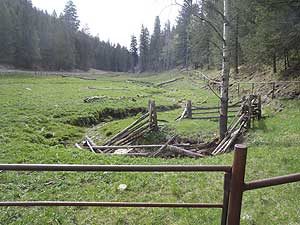The Court of Federal Claims (which reviews monetary claims against the U. S. government) decided a case in November that got a lot of attention in legal circles, but apparently not from the Forest Service. It held, in Sacramento Grazing Association v. U.S., that the Forest Service violated the Fifth Amendment to the U. S. Constitution by “taking” (without compensation) water rights owned by ranchers using the Sacramento Allotment on the Lincoln National Forest in New Mexico. They did this by constructing exclosures to keep cattle from trampling two federally listed plant species in wet areas, and amending the allotment management plan to prohibit cattle from entering the exclosures.
After determining that historic grazing had established water rights for the ranchers under state law, the court held that the Forest Service physically took the water rights because it denied the ranchers all access to their property interest. The court seemed to base its decision on prior cases that involved entirely fencing off a lake or totally denying access to minerals. The court did not directly address arguments raised by the Forest Service that water rights do not entitle a user to a particular source of the water, and that the permitted number of cows had been able to find sufficient water without using the sources having exclosures.
The court ordered further discussion between the parties of locating alternative water sources, which had been unsuccessfully attempted earlier. If that is not possible, the Forest Service would be faced with continuing to pay the ranchers, or removing the exclosures, potentially leading to violations of the ESA. Or maybe they could not renew the permit or terminate the allotment. In earlier stages of the case, the court had held that the grazing permits are not a property right, and in this case, the number of cattle permitted to be grazed had also been reduced. However, the court’s reasoning in this recent decision would appear to also produce a “taking” if the historic number of cows were not allowed to graze the allotment because fewer cows could not use the historic volume of water ranchers are entitled to.
The case seems to be viewed as an aberration among “takings” scholars, this blog post noting that this outcome should be barred by a precedent set by the Federal Circuit in another recent case. It is therefore a good candidate for appeal, but who knows what the current Administration might think about that, and it should have happened by now. Here is a take from the ranchers’ perspective (which takes off from the court’s invoking of the Malheur National Wildlife Refuge occupation as a similar situation with different results).

Environmentalism is a religion and should be treated as such; KEEP IT OUT OF OUR COURTS, OUT OF OUR SCHOOLS, AND STOP RAMMING IT DOWN OUR THROATS.
Ha ha! If only. Ok, how about this? Christianity is a religion. KEEP IT OUT OF OUR COURTS, OUT OF OUR SCHOOLS, AND STOP RAMMING IT DOWN OUR THROATS.
Environmentalism is in our courts mostly because we chose to pass some laws and imposed some obligations on ourselves. I think it’s a good thing for schools to teach what our obligations are (as well as our rights).
The issue that remains unaddressed is if the SGA has water rights, does that mean their cattle are guaranteed access to every foot of stream channel on the allotment, or could they be watered at select locations that allow them access to the stream, while being fenced out of critical habitat and most of the riparian area to protect not only endangered species but the health of the streams. Better yet, could the water be pumped to drinkers away from the stream and riparian zone?
Public lands grazing is a government handout to ranchers. Grazing fees don’t begin to cover the costs of administering the program. Ranchers seem to forget that federal grazing allotments belong as much to a resident of New York as they do to those running cattle on them. Ranchers typically cast themselves as law-abiding citizens and often as stewards of the land. The ESA is federal law. In exchange for the welfare that allows them to use, and often misuse, federal land for personal profit, the least they can do is work with regulatory agencies to accommodate all the needs and users of the land they are allowed to graze cattle on. If ranchers really are stewards of the land, they should want to take steps to reduce the heavy damage done to the watersheds in the Sacramentos in the past decades from overgrazing and unlimited access of cattle to stream riparian zones, and help repair the damage that has been done.